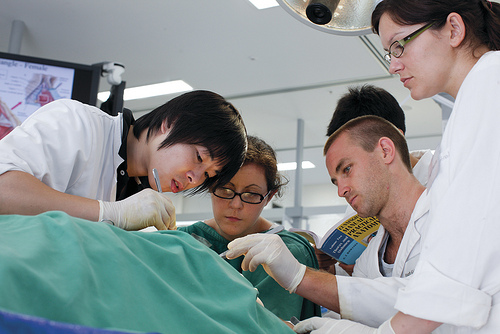International students in Victoria caught up in medical placement confusion
INTERNATIONAL students are being told they’ll be prioritised for medical internships in Victoria – even though there may not be enough placement spots for them to begin with. Amanda Yap reports.
International students studying medicine in Victoria are receiving conflicting information about how medical internships will be allocated to them.
The Victorian Department of Health recently stated international full-fee graduates of Victorian medical schools would be prioritised over local students from interstate universities and students from Monash University’s Malaysia campus with regards to medical placements.
On July 23, however, the Australian Health Ministers’ Advisory Council Chair Kim Snowball said international students could not be guaranteed medical internships in Australia due to limited numbers of placements.
“[In] recent years, all states have worked hard to keep pace and accommodate the growth in our local graduates, however as in previous years we are not able to fully guarantee all of the overseas students an internship.”
But the Postgraduate Medical Council of Victoria’s Michelle Dellamarta said international students could be reassured they would still be prioritised for medical placements, even if they missed out on the first round of placement offers on July 23.
She said graduates who were offered internships in the first round were given two weeks to accept or decline their offers and any excess or declined positions from the first round would be re-offered in Round 2 on August 9, 2012.
Priority would then be given to full-fee international students who graduated from Victorian clinical schools over interstate local and New Zealand graduates.
“However, this prioritisation will only happen in Victoria,” she said.
“The situation might be very different in other states.”
Medical placements are essential for graduate medical students to receive a year’s worth of critical training as well as general medical registration in order to be able to work as doctors.
International students welcome changes
Victorian international medical student Sean Tan Xia Xern welcomed the changes in prioritisation made by the Victorian government in favour of international students studying in Victoria.
“Local interstate students have higher preferences for jobs in their current states anyway, so in my opinion, it only removes their flexibility to swap to Victoria when applying for internship jobs,” he said.
“It does not really affect their chances of getting a job in the state they’re currently graduating in.”
Mr Tan said international medical students who were trained in Victoria were more used to the Victorian health system.
“Getting a better preference over interstate domestic students improves our odds of getting jobs only slightly – but it’s still big news,”
“That’s because if [international medical graduate students] can’t get jobs in Victoria, it will be almost next to impossible to get jobs in other Australian states,” he said.
Focus on number of spots, not who gets priority
Mr Tan shared the Australian Medical Association’s view that State governments needed to work together to fund enough training positions for all medical graduates rather than focus on priority placements.
“[There] is still a shortage of doctors and the intern spots are there to be created,” he said.
“From what I gather among my fellow international friends, the majority of us don’t mind taking up an intern job in a rural area – as long as we get a job.
“The problem is the government just can’t fund the spots.”
The Australian Medical Students’ Association (AMSA) President James Churchill said the student body was petitioning the Australian government to ensure there were sufficient numbers of medical internships.
“AMSA calls upon all Health Ministers to step up and create internship positions for all graduates of Australian medical schools as a matter of urgency,” he said.
“Our governments need to do what is best for Australia’s healthcare system and ensure these eager young graduates are provided the opportunity to serve the community as doctors.”
Why prioritise international students?
Australian Medical Association President Dr Steve Hambleton said there would be 3,512 medical school graduates nationally by the end of 2012.
But it is estimated there would be a shortfall of 492 internship places available for them across the country in 2013.
It has been expected international students studying in Australia would miss out on internships due to this shortage in availability.
But Dr Hambleton said a Health Workforce 2025 report demonstrated the importance of keeping a significant proportion of international medical students graduating as well as domestic medical graduates.
“This is essential if we are to ensure that the medical workforce can keep up with the future community need,” he said.
International student representative Blaise Wardle from the University of Sydney shared his view.
“The health workforce is heading towards a crisis and continuing to prop it up by temporarily importing overseas trained doctors is not sustainable nor is it wise.”
Mr Wardle said giving international students in Victoria higher priority for internships was an important step towards achieving self-sufficiency of the Australian health workforce.
But he said if the change did not happen nationwide, it would mean international students in other states would have less of a chance of securing medical internships.
“I would like to see all of the states across Australia make the same move, as it would go a long way towards retaining the international students who want to study in Australia,” he said.
For the latest updates on the medicial internship situation, visit the ‘National Internship Crisis‘ page run by the Australian Medical Students’ Association.

